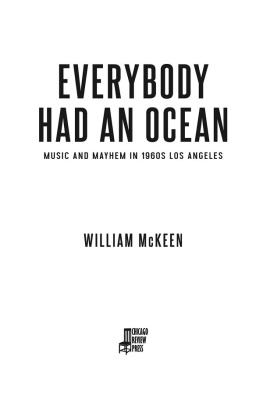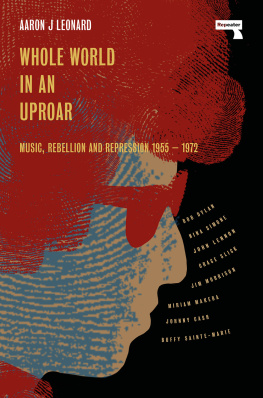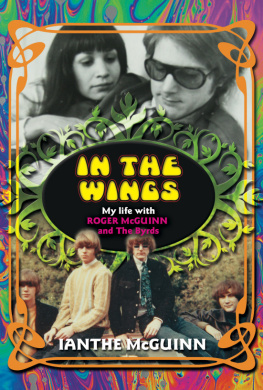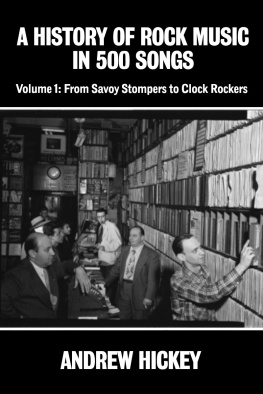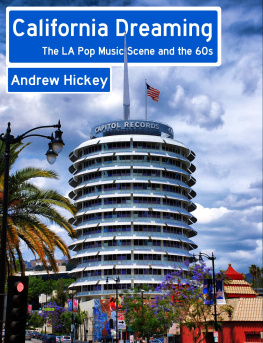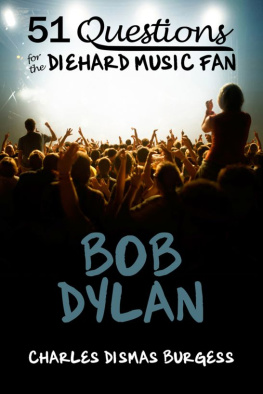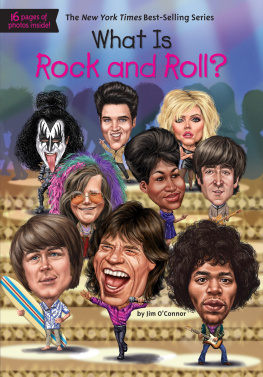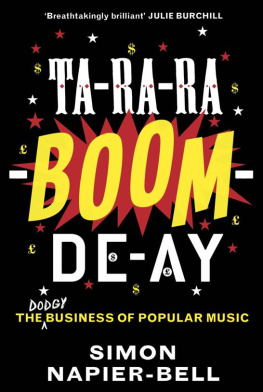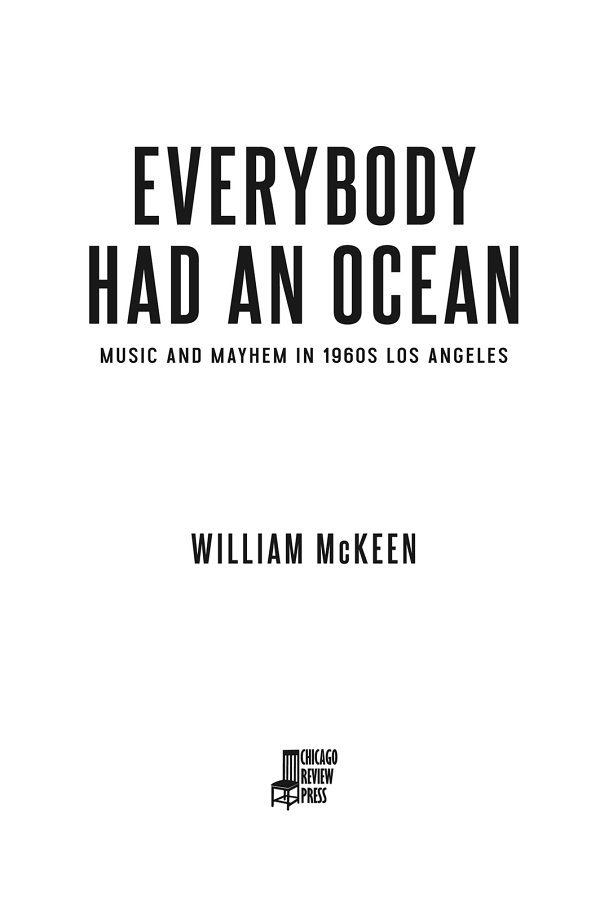
Copyright 2017 by William McKeen
All rights reserved
Published by Chicago Review Press Incorporated
814 North Franklin Street
Chicago, Illinois 60610
ISBN 978-1-61373-494-0
Library of Congress Cataloging-in-Publication Data
Names: McKeen, William, 1954 author.
Title: Everybody had an ocean : music and mayhem in 1960s Los
Angeles / William McKeen.
Description: Chicago, IL : Chicago Review Press, 2017. | Includes
bibliographical references and index.
Identifiers: LCCN 2016029172 (print) | LCCN 2016030065 (ebook) | ISBN
9781613734919 (cloth : alk. paper) | ISBN 9781613734926 (pdf) | ISBN
9781613734940 (epub) | ISBN 9781613734933 ( kindle)
Subjects: LCSH: Rock musicCaliforniaLos Angeles19611970History and criticism.
Classification: LCC ML3534.3 .M4 2017 (print) | LCC ML3534.3 (ebook) | DDC
781.6609794/9409046dc23
LC record available at https://lccn.loc.gov/2016029172
Typesetting: Nord Compo
Printed in the United States of America
5 4 3 2 1
This digital document has been produced by Nord Compo.
For those friends who share my affliction:
Bill DeYoung, Wayne Garcia, Sarah Kess,
Neil Sharrow, Steve Webb, and John Young
For my children, who share this music with me:
Sarah, Graham, Mary, Savannah, Jack, Travis, and Charley
CONTENTS


AUTHORS NOTE
I was sitting on the spare bed in Dennis Wilsons hotel suite. We had a few more minutes before the Beach Boys would take the stage at Cincinnatis Riverfront Coliseum. I was on a magazine assignment and had spent most of the day interviewing Carl Wilson and Alan Jardine and having dinner with Mike Love. Dennis didnt want an interview. He invited me to his room to drink a beer, watch television, and bullshit before the concert.
I asked about his old roommate, Charles Manson. Some things, he said, I dont talk about.
He didnt throw me out or berate me for asking about his friend, the mass murderer. Instead, he offered me a ride to the show in his limousine. When we got to the coliseum, where a couple of years later eleven fans would be trampled to death at a concert by the Who, we got out at the stage door. Inside the hall, he shook hands and clutched my shoulder, then walked up the riser to his drum kit. Ill never forget the crowds thunder as he took the stage. That was as close as Ill ever get to being a rock star.
I talked to Dennis several times in those years but never got out the Manson question before hed cut me off. I was persistent because I wanted to know what it was like to wake on that morning when everybody finally knew about Manson and connected him with the Tate and LaBianca murders.
Imagine one of your best friends lived in that house on Cielo Drive. Youd been there for parties. Youd sipped vodka in that living room where Sharon Tate and Jay Sebring were butchered. Youd played football on the lawn where Abigail Folger was killed, stabbed twenty-eight times.
And you knew this guy, the man responsible. When you couldnt turn him into the rock star he so desperately wanted to be, he threatened to kidnap your five-year-old son. He left a bullet with a friend of yours and said, Tell Dennis theres more where that came from.
So what was it like, Dennis? How did it feel that morning when you woke up and Manson was in all the papers? Well never know.
Long before reality television shows made hoarders into celebrities, Id begun stockpiling stories about the artists in that time and placeLos Angeles rock n roll in the sixties. Some of the most joyous music of my life was made there and then, but the trajectory of that decade led to a season of dread. Over the years, interviewing other artists from that era, Id always have to ask a Manson question. Few wanted to talk about it. Bad vibrations, they said.
When I was diagnosed with cancer, I figured it was time to finally do this book, which Id been thinking about for years. My illness rendered me sedentary, but I still wanted to tell the story, not knowing if Id ever have another chance. Carl and Dennis Wilson are gone, as are so many others Id interviewed, as well as others gone before I could speak to them. Ive done my best to tell their stories.
William McKeen
Boston, Massachusetts
INTRODUCTION
BROTHERS
From the world of darkness I did loose demons and devils in the power of scorpions to torment.
Charles Manson
It was there in his face, loss and doubt behind hollow eyes. Once, hed been unstoppable, one of the most successful young men of his generation. He was the reclusive king of California rock n roll, ruling from the background as a music industry was transformed around him and, in some ways, because of him. But at the key moment, when the whole world was watching, he abdicated and withdrew into his cocoon.
That was last year. Now it had reached the point where Brian couldnt let go of anything. He was intimidated, gun-shy, pathologically apprehensive, and much too afraid to let his songs out into the world, where they would be played and heard and judged by others.
No matter how great the songs, no matter how much everyone told him he was a genius, Brian Wilson was afraid of the criticism that came after he shared the music in his soul. So he kept adding superfluous fractions of melody to the recordings until he worked the musicians, and especially his brothers, up to a plateau of exhaustion and impatience. As long as we are all working, he thought, then we never have to finish. Thus was the state of Brians mental illness in the spring of 1968.
Difficult as it was now, in the middle of the night, and bleary at the end of a long recording session, Dennis Wilson still couldnt help but admire his big brother. At that point in their history, the Wilson brothers (including younger brother Carl) had spent five golden years as Americas preeminent rock n roll band, the Beach Boys. Theyd begun recording in 1961, when Carl was just fifteen. Brian, nineteen then, was responsible for writing, producing, and arranging all of the groups recordings. It was a lot of responsibility for a guy not yet old enough to vote.
The Wilson brothers came from modest beginnings in Hawthorne, California, cheek by jowl with Los Angeles, but, as they bragged in one of their hit songs, theyd been all around this great big world. Not bad for five boys from the suburbs.
Most rock n roll artists, up to that point, had been subject to the whims of Svengali-like record producers or music business executives serving as masterminds behind the scenes, telling the young artists what to record, how to record it, and what musicians to use on the recording.
The Beach Boys were among the first to have its Svengali as a member of the band. Dennis once said of his older brother, Brian Wilson is the Beach Boys. He is the band. Were his fucking messengers. He is all of it. Period. Were nothing. Hes everything.
Brians messages had sold millions of copies and made the Beach Boys famous. But now detractors were stepping forward to knock the great Brian Wilson off his pedestal.
All evening and into the cracks of morning, Dennis had watched Brian, in his home studio, go through more than twenty takes of a new song called (for the moment) Even Steven. Instruments had been recorded the week before, and the track had a vague sort of bossa nova sound that would have been hot stuff ten years ago but that seemed monstrously out of place in the berhip late spring of 1968.

